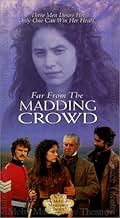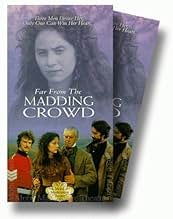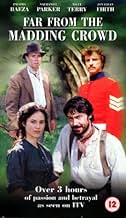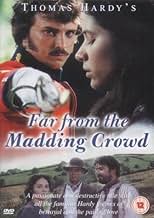A vain, pretty girl has recently taken over her uncle's farm. Her independent, naïve personality leaves her torn between the three men who wish to marry her.A vain, pretty girl has recently taken over her uncle's farm. Her independent, naïve personality leaves her torn between the three men who wish to marry her.A vain, pretty girl has recently taken over her uncle's farm. Her independent, naïve personality leaves her torn between the three men who wish to marry her.
- Won 1 BAFTA Award
- 2 wins & 2 nominations total
Featured reviews
This is a wonderful adaption of the great Thomas Hardy novel. Though the 1960's version (starring Julie Christie, Alan Bates,and Terrance Stamp) is gorgeous, this film is not so dated and the performances are in keeping with the original intent of the novelist. All the principles are strong but especially impressive is Nigel Terry's performance as doomed Mr. Boldwood whose love for Bathsheba drives him from hope and new-found happiness to despair and frenzy.
The locations are beautiful - almost another character in the story. The dialects of the locals may be difficult to understand at first but my ear learned to listen. The video version allows for playback of difficult to understand dialog.
Definately worth the 4 hour investment. It made me re-read the novel and enjoy it all over again.
The locations are beautiful - almost another character in the story. The dialects of the locals may be difficult to understand at first but my ear learned to listen. The video version allows for playback of difficult to understand dialog.
Definately worth the 4 hour investment. It made me re-read the novel and enjoy it all over again.
I am a big fan of movies that follow the novel, and this version does not disappoint. It helps if one truly loves literature, as I do, but even so this story is incredible. The film makers did a wonderful job with this. It makes me want to move back to England when I watch it.
I finally saw the 1967 version of Hardy's story, and while I thought it had excellent performances, the 1998 version is more satisfying. I've always liked both Alan Bates and Nathaniel Parker, but I think I'd have to give the latter the nod for his portrayal of the upright, conscientious Gabriel Oak. Nigel Terry is superb as the tragic Mr. Boldwood; his entire demeanor commanded more sympathy from me than did Peter Finch's portrayal -- you simply ache for the poor fellow when he's trying to gain even the slightest bit of encouragement from Paloma Baeza (who is exceptional as Bathsheba). I also thought this version was brighter and warmer than the visually gloomy, bleak 1967 version. (Well, perhaps that's really what Wessex looks like.) I realize this isn't exactly a happy tale, but it's nice to see SOME upbeat moments and sunshine once in awhile. All in all, a very satisfying performance -- a few hours well-spent.
10Lady X
Having read this book more than once (it is my favorite Thomas Hardy book, and one of my favorite books of all time), and having seen both filmed versions, I have to say that the original version (with Alan Bates, Julie Christie and Peter Finch) cannot hold a candle to the second (with Nathaniel Parker, Paloma Baeza and Nigel Terry).
The original version was a great disappointment to me -- Julie Christie was, as another reviewer pointed out, too old for the part of Bathsheba, did not fit Hardy's description of her at all, and has never impressed me as much of an actress -- a major casting faux pas, in my opinion. Peter Finch, as Boldwood, did not elicit the strong feeling of empathy from me, as Nigel Terry did in his portrayal of the character. The greatest surprise to me, in regard to the first version, was that I also felt the same about Alan Bates' performance as Gabriel Oak -- he did not convey the emotions and the quality of Oak's character, as described by Hardy in the book, and I found his portrayal to be bland, boring, and, at times, overacted. Part of the blame would have to be shared by the director of that version -- the actors appeared to be acting, and neither they, nor the director, seemed to have a firm grasp or understanding of the explicit emotions and personalities of the characters, which Hardy had gone to great effort and detail to describe in the book.
After having seen Nathaniel Parker's interpretation of Gabriel Oak, I cannot imagine anyone else playing the part -- it was the first time I had seen Mr. Parker in any performance, and he ripped my heart out with his portrayal of this noble, dignified, aggrieved and tormented soul. He and Ms. Baeza, Mr. Terry, and Mr. Firth (Sergeant Troy), seemed to have a thorough comprehension of, and sensitivity toward, the characters as they were intended by Thomas Hardy -- they appeared to have walked straight out of the pages of the book! In addition, the sensitive and intuitive direction by Nicholas Renton drew powerful performances from all, including a superior supporting cast. The accurate period costumes, and beautiful sets and cinematography, serve to round out a production of true quality.
I highly recommend to anyone interested in this story, that he or she consider reading the book first. Although this screenplay remains true to the book, some of the detail which enhances understanding and feeling for the characters, the time period, and the plot, was edited due to time constraints, as is common with filmed productions of great pieces of literature.
The original version was a great disappointment to me -- Julie Christie was, as another reviewer pointed out, too old for the part of Bathsheba, did not fit Hardy's description of her at all, and has never impressed me as much of an actress -- a major casting faux pas, in my opinion. Peter Finch, as Boldwood, did not elicit the strong feeling of empathy from me, as Nigel Terry did in his portrayal of the character. The greatest surprise to me, in regard to the first version, was that I also felt the same about Alan Bates' performance as Gabriel Oak -- he did not convey the emotions and the quality of Oak's character, as described by Hardy in the book, and I found his portrayal to be bland, boring, and, at times, overacted. Part of the blame would have to be shared by the director of that version -- the actors appeared to be acting, and neither they, nor the director, seemed to have a firm grasp or understanding of the explicit emotions and personalities of the characters, which Hardy had gone to great effort and detail to describe in the book.
After having seen Nathaniel Parker's interpretation of Gabriel Oak, I cannot imagine anyone else playing the part -- it was the first time I had seen Mr. Parker in any performance, and he ripped my heart out with his portrayal of this noble, dignified, aggrieved and tormented soul. He and Ms. Baeza, Mr. Terry, and Mr. Firth (Sergeant Troy), seemed to have a thorough comprehension of, and sensitivity toward, the characters as they were intended by Thomas Hardy -- they appeared to have walked straight out of the pages of the book! In addition, the sensitive and intuitive direction by Nicholas Renton drew powerful performances from all, including a superior supporting cast. The accurate period costumes, and beautiful sets and cinematography, serve to round out a production of true quality.
I highly recommend to anyone interested in this story, that he or she consider reading the book first. Although this screenplay remains true to the book, some of the detail which enhances understanding and feeling for the characters, the time period, and the plot, was edited due to time constraints, as is common with filmed productions of great pieces of literature.
10reg-4
As a native of 'Hardy country', I feel I have a duty to comment on this production. I, as with many other people in England, eagerly awaited this series, and I have to say I was not disappointed. As us English have come to expect from our television dramas, the locations and costumes were fantastic, but this has the added bonus of an extremely accomplished screenplay. Also, the acting is superb. The accents, one of the major stumbling blocks to American acceptance, are accurate enough to satisfy English viewers (including those with the same accent!), while at the same time allowing American viewers to understand the dialogue. Particular praise should, I feel, go to Nathaniel Parker, who has achieved something very spectacular, in eclipsing Alan Bates' 1967 performance as the faithful shepherd Gabriel Oak. All in all, a feast of Wessex magic which can be enjoyed by all. Nice one.
Did you know
- TriviaFeatured playing period music is the Mellstock Band, which also appeared in Tess of the D'Urbervilles (1998).
- ConnectionsVersion of Far from the Madding Crowd (1909)
- SoundtracksGee-Ho! Dobbin!
Performed by Paloma Baeza
Details
Contribute to this page
Suggest an edit or add missing content

Top Gap
By what name was Far from the Madding Crowd (1998) officially released in Canada in English?
Answer





























